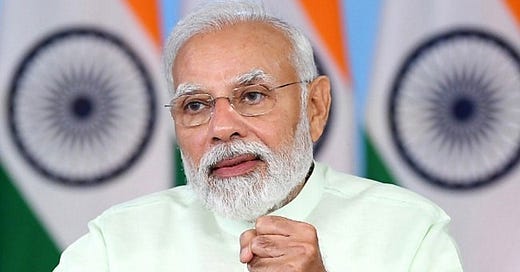India's Modi Backs Away from Hindu Extremism
Realization dawns that Hindutva has international consequences
India has been delivered a sharp, well-deserved shock, one which makes the very simple point that the nation cannot claim to be a major force in world affairs while being in thrall domestically to primitive and bigoted Hindu ideologists.
Modi himself may have seen that he cannot ride his Hindu bandwagon while at the same time being seen to be an increasingly important actor. The condemnation which greeted the anti-Muslim remarks of two leading BJP spokespersons came not just from Saudi Arabia and Gulf states known to be particularly prickly, Iran and Afghanistan, but also from Malaysia and Indonesia—the latter usually less sensitive in such matters.
That one of the persons making the offensive remarks was suspended from the BJP and another expelled while elsewhere a youth leader was arrested showed how alarmed Delhi was by the situation and the unanimity of Muslim response. The party suspended Nupur Sharma, one of its national spokespersons, for her anti-Islam remarks in a television debate end of May and expelled Naveen Kumar Jindal, who heads the party’s media unit in Delhi for his inflammatory tweets about the Prophet.
In the short term, this response should calm relations but it is now clear that the Muslim neighbors have been alerted to the steady rise of anti-Muslim sentiment in India spurred by the activists of Modi’s party and hitherto tolerated by the prime minister himself.
“The BJP strongly denounces insults of any religious personalities of any religion. The Bharatiya Janata Party is also against any ideology which insults or demeans any sect or religion. The BJP does not promote such people or philosophy,” a party spokesperson said in a brief statement. “During the thousands of years of the history of India every religion has blossomed and flourished. The Bharatiya Janata Party respects all religions.
India today mostly sees itself in competition with China, which is far ahead but with which it senses an ability to catch up in a couple of decades thanks in part to its young and still growing population. But moves such as joining the Quad with the US, Australia, and Japan are of minor help in keeping China at bay if its Muslim neighbors become antagonistic. At a basic economic level, India depends heavily on Saudi Arabia and the Gulf for energy imports and on the remittances sent by the millions of Indian workers in the region, and the profits of Gulf-based Indian businesses. Gulf foreign exchange surpluses are seen as a source of capital for India and Westen investment too can be wary of anything smacking of anti-Muslim bias.
Likewise, trade relations with Indonesia have been of growing importance and there has been talk of defense procurement. Relations with Pakistan may be permanently bad but cooperation with Bangladesh is important for several reasons, including China. Iran may still be sanctioned and weak but ties with India are strategically important for both and any change of direction in Tehran could quickly lead to more trade.
Of course, all these countries have their own interests in not allowing relations to be too damaged by militant Hinduism but the fact remains that there are many predominantly Muslim countries, large and small, and only three predominantly Hindu ones – India, tiny Mauritius, and small Nepal. The closer Muslim ones have now given notice individually and collectively (via the Organization of Islamic Cooperation (OIC) that they are watching how supposedly secular, plural India treats its Muslim minority (about 14% of the population).
That several of these Muslim majority countries are even more intolerant of other religions and hostile to secularism is beside the point. India cannot afford to alienate them if it wants more regional and world influence. Hitherto, foreign attention to anti-Muslim activity has been largely confined to human rights organizations like Amnesty. Modi’s 2019 Kashmir status grab did raise eyebrows overseas but this latest episode is likely to result in more permanent attention to the rights of Indian Muslims as a whole.
The other aspect Modi needs to consider is domestic. India cannot be a major player abroad if its own society is fractured. Most Indians are Hindu but intolerance of Muslims pushed by BJP activists also casts doubt on the linguistic and cultural pluralism without which the Union probably cannot survive.
Modi’s political success cannot be seen simply as reflecting the appeal of Hindu identity. More important is his own appeal as a leader with a reasonably coherent economic program at a time of incoherent opposition. But how much does the BJP’s core and hence its coherence as a party depend on intolerant Hindu activists who run the party at the local level? The quick response to foreign Muslim outrage was encouraging but Modi needs to walk back the intolerance which his party has promoted if India is to gain the respect it feels it deserves as a rising economic power, not a backwater ruled by religious zealots.





The hype on extreme religious mindset will destroy any multinational country's security and economy !
He has done all his life career based on extremism. He has not said anything to indicate that he is backing away.